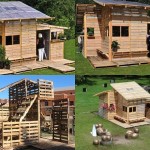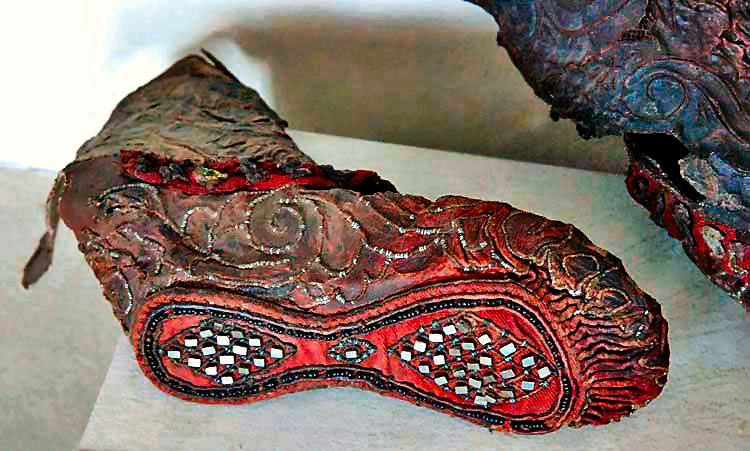It’s absolutely amazing to see what some people are using to make tiny houses these days. The materials have become smaller and more affordable while the houses themselves continue to impress with their beauty, clever use of allotted space, and coolness factor.
In this gallery, you’ll see how a group named I-Beam Design has taken the concept of the tiny house to a whole new level by using wooden shipping pallets to create affordable, dependable shelters that can be constructed by just about anyone (with instructions and drawings available for less than $100!).
We love seeing innovative, cool tiny houses here and I-Beam Design’s awesome Pallet House project seems like it could not only transform one individual’s concept of a home, but it could also be used in places where housing and shelter is extremely hard to come by.
Check it out and let us know if you think you might give building a Pallet House a shot!
Please SHARE this amazing project with family and friend
————————————————————————————————————
The Pallet House project was initially conceived by I-Beam Design to replace the typical tent solution of transitional shelter for refugees returning to Kosovo.

“These people needed an immediate alternative to the typical tent solution that could potentially transform into a new permanent home over time,” says I-Beam Design on their website, “even without access to sophisticated tools and materials.”
They have since expanded their project to include traditional housing situations for people looking for affordable, modular homes everywhere.

“It has since become our aim to also develop the project as a more permanent housing solution to serve not only refugees in disaster stricken areas but also as a modular, prefabricated solution to affordable housing everywhere that can improve people’s lives, the environment, society and even inspire greater diplomacy among the various cultures of the world.”
The Pallet House is made almost entirely of wooden shipping pallets that are easily available in most countries.

“Pallets are versatile, recyclable, sustainable, easily assembled and universally esthetically pleasing,” I-Beam writes on their website. “They are readily available in most countries and their transportation cost and weight is negligible when used to carry shipments of clothing, food, medical supplies or other relief aid. A simple pallet structure evolves naturally from emergency shelter to permanent house with the addition of more stable indigenous materials like rubble, stone, earth, mud, plaster and concrete.”
The flexibility and ease of construction (with the simple instructions and drawings from I-Beam Design) are what make the Pallet House such an attraction option for so many people.

“The evolution of one 16′ by 16′ shelter into a permanent home requires approximately 100 pallets nailed or strapped together and lifted into place. Tarps draped over the basic structure or plastic corrugated sheets prevent water penetration until enough debris, stone, mud, earth, wood or any material from the immediate surroundings can be gathered to fill the wall cavities and cover the roof. Pallets may be pre-assembled with styrofoam insulation, vapor barrier, plywood or corrugated sheathing prior to shipping as well. As infrastructure is restored and cement or other materials become available the filled pallets can be covered with stucco, plaster, or roofing tiles transforming the makeshift shelter into a permanent home within a year or two.”
For those unfortunate folks who may have been displaced by a natural disaster or economic troubles, the Pallet House might serve as the perfect temporary-to-long-term solution to their need for shelter.

“The Pallet House is an inexpensive, efficient and easily realizable solution to the problem of housing people displaced by natural disaster, plagues, famine, political and economic strife or war. It is intended to serve returning refugees who come home and find their house partially or fully destroyed. This type of transitional housing bridges the gap between temporary tent shelter and permanent home.”
The Pallet House also makes a quick and affordable way to create a special shed, cabin, or any other type of outdoor shelter you might want to add to your backyard as well.

“The Pallet House adapts easily to almost every climate on Earth, and can be built in less than a week.”
With the addition of insulation, some interior-design touches, and some other niceties, the Pallet House can become just as beautiful as many of the other amazing tiny houses you’ve seen.

“The pallet module provides great flexibility in terms of configuration, allowing each family to build according to their own needs. The size and layout of each home can evolve over time encouraging the participation of the community that lives in the houses.”
The Pallet House has received raves around the world and has even been featured in the New York Times.

“The Pallet House won an Honorable Mention in a competition to design transitional housing for the returning refugees of Kosovo. It was featured in the New York Times article on Architecture for Humanity, Spain’s Sunday magazine El Pais as one of the few projects in the 2000 Venice Architecture Biennale on-line exhibit to successfully address the exhibition theme “Less Aesthetics, More Ethics”, and was published in the book Design Like You Give a Damn. The Pallet House has received grants from NYSCA and the LEF Foundation towards design development.”
Most importantly, however, is the Pallet House’s impact on those in immediate need of shelter, its ability to positively impact the environment, and the inspirational message behind the fact that ANYONE can use it to rebuild their life.

“Architecture, design and construction have a huge impact on the environment and society. The recent events in China, Myanmar, Iraq, Darfur, Afghanistan, Katrina have unfortunately made us all the more aware of the symbolic, cultural and physical power of buildings. But there is another more pressing architectural crisis that affects all nations, and that is the question of housing of the 1 billion people who live in substandard housing around the world. The Pallet House provides a viable solution to the housing crisis while simultaneously empowering individuals with simple materials and tools to rebuild their lives as they see fit.”








 Photographer Finds Locations Of 1960s Postcards To See How They Look Today, And The Difference Is Unbelievable
Photographer Finds Locations Of 1960s Postcards To See How They Look Today, And The Difference Is Unbelievable  Hij zet 3 IKEA kastjes tegen elkaar aan en maakt dit voor zijn vrouw…Wat een gaaf resultaat!!
Hij zet 3 IKEA kastjes tegen elkaar aan en maakt dit voor zijn vrouw…Wat een gaaf resultaat!!  Scientists Discover 512-Year-Old Shark, Which Would Be The Oldest Living Vertebrate On The Planet
Scientists Discover 512-Year-Old Shark, Which Would Be The Oldest Living Vertebrate On The Planet  Hus til salg er kun 22 kvadratmeter – men vent til du ser det indvendigt
Hus til salg er kun 22 kvadratmeter – men vent til du ser det indvendigt  Superknepet – så blir snuskiga ugnsformen som ny igen!
Superknepet – så blir snuskiga ugnsformen som ny igen!  Meteorite That Recently Fell in Somalia Turns Out to Contain Two Minerals Never Before Seen on Earth
Meteorite That Recently Fell in Somalia Turns Out to Contain Two Minerals Never Before Seen on Earth  Nearly Frozen Waves Captured On Camera By Nantucket Photographer
Nearly Frozen Waves Captured On Camera By Nantucket Photographer  It’s Official: Astronomers Have Discovered another Earth
It’s Official: Astronomers Have Discovered another Earth 